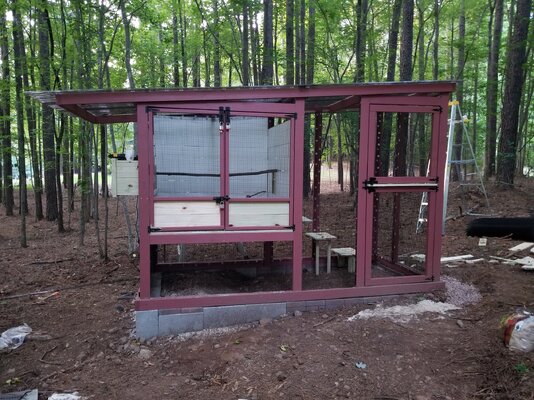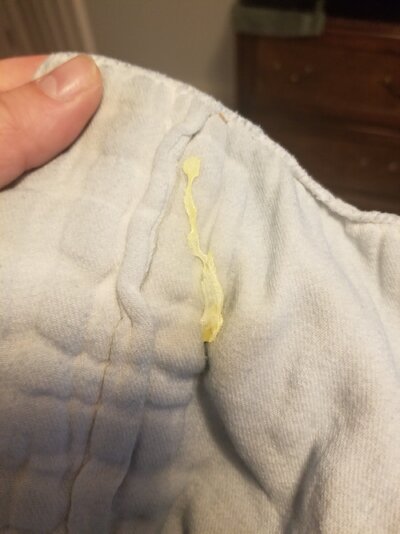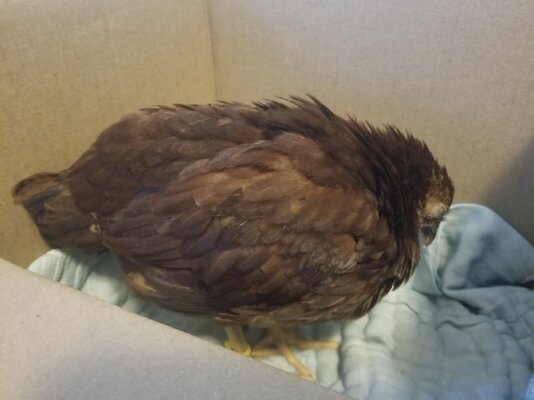MenelausMontrose
Chirping
Hello all,
My bantam Rhode Island pullet has taken a sudden downward turn, and I would appreciate any advice.
On Wednesday this week she was acting slow and lethargic (although still moving around and eating). She had diarrhea. None of the other 10 pullets were behaving like that, but I went ahead and started dosing their water with liquid amprolium. I had also begun switching them from medicated chick starter to unmedicated, so I suspected coccid.
She improved the same day and was acting normally and energetically Thursday.
Last night we had a massive storm roll through here in NC and I discovered some water drainage issues in my run design. The pullets have stayed locked in the coop. I did not notice any issues with her today this morning or at noon, but I could have missed something due to my focus on the issues with the run.
This evening she is extremely lethargic. She stands or sits with her eyes closed and barely fights us if we use an eye dropper to giver her fluids. Relevant details below.
1) She is a bantam Rhode Island hen. 7 weeks and 2 days old. As of 7/8 she weighed 300 grams, and appears to be about the same size as her two comparable siblings who haven't had any health issues. She hasn't either, up until now.
2) The bird is extremely lethargic and is sitting or standing with her eyes closed during the daylight, while the rest of the flock is active.
3) I've only noticed these symptoms two hours ago when I got off work.
4) None of the other birds are exhibiting symptoms.
5) There are no signs of trauma.
6) I threw a snail and some daddy-long-legs in the coop on Tuesday. Not sure if she got any of them. On Wednesday they went into the run for the first time.
7) She's been drinking amprolium laced water (1/2 teaspoon per quart; 3/8ths today) as her only water supply. Food consists of non-medicated chick crumbles, and freeze dried mealworms, plus what she finds in the run.
8) Her most recent poop is very liquid, and colored white and yellow. Photo attached. There is no blood.
9) She's been getting amprolium in her water. I just mixed a couple drops of amprolium with a teaspoon of molasses, a couple tablespoons of water, and a dusting of Sav-A-Chick electrolytes and gave her a couple squirts (5-6 drops?) with an eyedropper.
10 ) I intend to treat her myself.
11) Photo attached of the chicken.
12) Coop is raised and measures 5'x5', with a 5'x10' run underneath. Bedding is hemp. Coop is very well ventilated; photo attached.
My bantam Rhode Island pullet has taken a sudden downward turn, and I would appreciate any advice.
On Wednesday this week she was acting slow and lethargic (although still moving around and eating). She had diarrhea. None of the other 10 pullets were behaving like that, but I went ahead and started dosing their water with liquid amprolium. I had also begun switching them from medicated chick starter to unmedicated, so I suspected coccid.
She improved the same day and was acting normally and energetically Thursday.
Last night we had a massive storm roll through here in NC and I discovered some water drainage issues in my run design. The pullets have stayed locked in the coop. I did not notice any issues with her today this morning or at noon, but I could have missed something due to my focus on the issues with the run.
This evening she is extremely lethargic. She stands or sits with her eyes closed and barely fights us if we use an eye dropper to giver her fluids. Relevant details below.
1) She is a bantam Rhode Island hen. 7 weeks and 2 days old. As of 7/8 she weighed 300 grams, and appears to be about the same size as her two comparable siblings who haven't had any health issues. She hasn't either, up until now.
2) The bird is extremely lethargic and is sitting or standing with her eyes closed during the daylight, while the rest of the flock is active.
3) I've only noticed these symptoms two hours ago when I got off work.
4) None of the other birds are exhibiting symptoms.
5) There are no signs of trauma.
6) I threw a snail and some daddy-long-legs in the coop on Tuesday. Not sure if she got any of them. On Wednesday they went into the run for the first time.
7) She's been drinking amprolium laced water (1/2 teaspoon per quart; 3/8ths today) as her only water supply. Food consists of non-medicated chick crumbles, and freeze dried mealworms, plus what she finds in the run.
8) Her most recent poop is very liquid, and colored white and yellow. Photo attached. There is no blood.
9) She's been getting amprolium in her water. I just mixed a couple drops of amprolium with a teaspoon of molasses, a couple tablespoons of water, and a dusting of Sav-A-Chick electrolytes and gave her a couple squirts (5-6 drops?) with an eyedropper.
10 ) I intend to treat her myself.
11) Photo attached of the chicken.
12) Coop is raised and measures 5'x5', with a 5'x10' run underneath. Bedding is hemp. Coop is very well ventilated; photo attached.
Attachments
Last edited:






